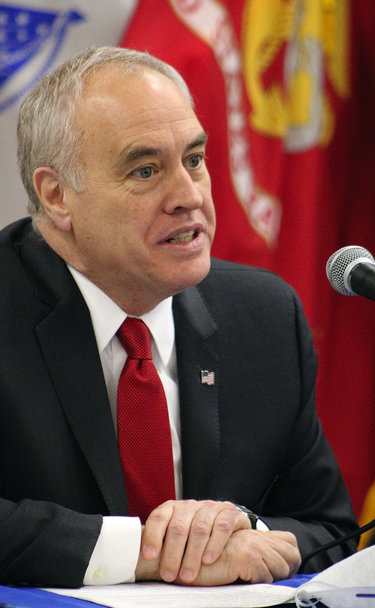Comptroller faces ‘cash-flow crunch’ as revenues evaporate
ALBANY COUNTY — The state’s revenue loss continues to grow in the midst of the shutdown to stem the spread of the coronavirus.
“We are in a new economic reality. We are in a challenging economic landscape …,” the state’s comptroller, Thomas DiNapoli, said on Wednesday at the county’s press briefing. “We still don’t know where it’s headed so a lot of what we’re talking about is still very tentative information.”
In mid-March, the governor’s office asked DiNapoli’s office to come up with a new revenue estimate as the state’s budget was being finalized. “We estimated the impact of this crisis would conservatively result in a $4 billion revenue hit … to as much as $7 billion or more,” said DiNapoli.
“Where are we now over a month later? The range is really more like 10- to 15-billion dollars, and we’re still not sure,” the comptroller said.
The freezing of the economy, the lack of business activity, unemployment, and the decline in sales-tax revenue are all contributing to the losses, he said.
DiNapoli cited a report by the New York State Association of Counties that predicts losses in sales-tax revenue ranging from 4 to 12 percent. The state faces a similar loss in income tax since people aren’t working, he said.
The extension for filing income taxes will make it hard to meet “big commitments” like school-aid payments, DiNapoli said. “We really are facing a cash-flow crunch … Navigating just April, May, and June is going to be a challenge.”
Although the state legislature and the governor came up with a budget nearly on time, DiNapoli said, “In many ways, the budget is a work in progress so they’re placeholders in there for broad discretion by the governor to adjust spending. And much of New York State’s budget … goes back to localities and school aid.”
He concluded, “If the money’s not coming in, the governor may have to adjust those numbers downwards.”
Unemployment is also a big concern, DiNapoli said. The state’s Department of Labor has updated the way to apply for benefits with goal being to now have a 48-hour turnaround, he said.
DiNapoli mentioned the United States Senate’s passage on Tuesday of a $484 billion federal package that will help small businesses and hospitals and pay for testing.
“What is really needed is more help from Washington,” he said, for states and localities. “If the state has a budget hole — the governor said this not as a threat but a reality — if we don’t have the money, then the money that would flow [to localities] isn’t going to happen.”
DiNapoli also mentioned that people who are not working might not be able to pay their property taxes.
Albany County Executive Daniel McCoy said he asked the county legislature on Tuesday if he could deliver his county budget on Nov. 10 instead of Oct. 10 “because there are so many uncertainties.”
He said, “If the state doesn’t get the money it’s entitled to from the federal government, it will come down to the counties.”
DiNapoli said that New York has one of the best-funded public pension plans in the nation, which should be “a source of comfort.” But, although the final numbers are not yet in for the March 31 valuation of the fund, DiNapoli said, “We are going to take a hit.”
For context, he said, with the Great Recession, the fund was down 26 percent in one year. “We’re nowhere near that. That’s the good news … We have plenty of liquidity … Pension checks are being paid.”
DiNapoli announced that Governor Andrew Cuomo had just signed an executive order, to go into effect retroactively, that will waive the 15-day waiting period for retirement payments to take effect. If a government worker dies during the usual 15-day period, his beneficiaries do not get retirement benefits; they get death benefits but, for many, the retirement benefits are more valuable, DiNapoli siad.
A limited number of government employees working on the frontlines with the pandemic had died before the 15 days were up, so DiNapoli’s office asked for a waiver, he said.
DiNapoli also said it is important to remember the “human dimension” of the pandemic — “the sickness, the loss of life.” He said, “I don’t know how you ever calculate that.”



